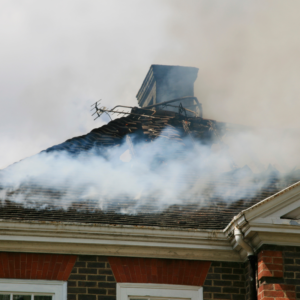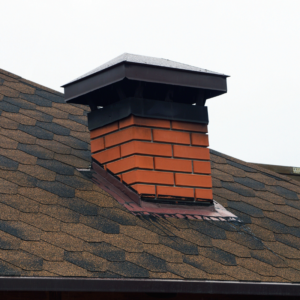You should never let a chimney fire burn itself out – always call emergency services immediately if a chimney fire occurs.
All fires will technically burn themselves out eventually, but that doesn’t mean they should. The questions of how long they will last and how much damage they will do in the process become very important when taking this into consideration. And a chimney fire isn’t something you ever want to just let burn out.
You should never let a chimney fire burn itself out – always call emergency services immediately if a chimney fire occurs.
Between 2015 – 2017, over 17,000 chimney fires occurred every single year, causing injuries, fatalities, and millions of dollars in property damage. This makes chimney fires a big deal and knowing how to spot them, what to do if you have one, and how to prevent them is an important part of owning a fireplace.
How Do I Know if I’ve Had a Chimney Fire?
Chimney fires are not always obvious and may go undetected by the homeowner. In fact, it isn’t uncommon for neighbors to notice the chimney fire before the owner does. We’ve even heard stories of the fire department being called to a property only to surprise the homeowner who didn’t know their chimney was on fire.
This is why it’s important to know how to spot them if they do occur. There are two types of chimney fires – fast-burning and slow-burning. Make sure you know the signs of each to keep your home and family safer.
Fast-Burning Chimney Fires
 Fast-burning chimney fires are more obvious, and they often come with exploding sounds. Some people have described hearing noises similar to that of airplanes or trains as a fast-burning chimney fire is occurring.
Fast-burning chimney fires are more obvious, and they often come with exploding sounds. Some people have described hearing noises similar to that of airplanes or trains as a fast-burning chimney fire is occurring.
A fast-burning chimney fire will also often cause flames, sparks, or thick plumes of black smoke to spew from your chimney – this can easily be spotted from outside. While smoke is supposed to come out of the chimney, black/thick smoke and fire escaping from the top of a chimney is not normal.
Accompanying the sounds and the sights of a fast-burning chimney fire will often be a smell of intense heat and burning. If you notice any of these, call the fire department immediately.
Slow-Burning Chimney Fires
The other type of chimney fire is the slow-burning fire. Sometimes the ignited contents of the chimney don’t have enough air to cause the same sort of show that the fast-burning fire displays. Instead, intense heat will build up and slowly work its way through your flue, causing significant damage, completely unbeknownst to the homeowner.
Because of this, the slow-burning chimney fire can actually be more dangerous than a fast-burning chimney fire. Homeowners will continue lighting fire, completely unaware they have damage and that heat and flames could easily spread to other areas of the home.
Signs that a slow-burning chimney fire has occurred include:
- honeycombed creosote
- warped/distorted metal components (chimney caps, tv antennas, etc.)
- cracks in your masonry
- smoke escaping the walls of your chimney
- roofing damage
- chunks of flue tile in your firebox
- creosote flakes on your roof or around your home
What Causes Chimney Fires?
The main culprit of chimney fires is a combustible material called creosote. Creosote is the byproduct of things burned in the fireplace. As the smoke from your fires rises, so does various chemicals released from the materials being burned. These chemicals cool more quickly than the smoke, causing them to condense and stick to the walls of the chimney as they reach the top of it.
Over time, this mixture of chemicals (aka creosote) will build up and create a highly combustible and highly dangerous coating on the inside of your chimney.
Creosote ignites at around 451 degrees F, and once ignited, creosote can burn at over 2000 degrees F, which can destroy clay tiles and flue liners in a very short time.
Creosote isn’t the only thing that can cause chimney fires, however. Flammable materials that block the chimney can lead to fires, as well. Squirrels, birds, raccoons, and other critters have been known to make their homes in chimneys. Their nests can block up airflow and ignite, so be sure to schedule your sweeping if you have yet to do so.
What Do I Do if I Notice a Chimney Fire in My Home?
The first thing you should do is get everyone out of the house. Like any fire in the home, your safety is the priority. Get all people out of the home and to a safe spot.
Once safe, call the fire department. They are equipped to stop the fire and minimize as much damage as possible.
After the fire is out and everyone is safe, make sure to schedule an inspection to assess damages and to make a plan for necessary repairs. Do not use your chimney until it’s been inspected and deemed suitable for use by a professional sweep. The last thing you want to do is start another fire.
How Do I Prevent Chimney Fires?
Here are 5 things you can do to minimize the risk of chimney fires.
 Make sure you burn dry and properly-seasoned wood. Wood that has been dried and seasoned well will burn more efficiently. This means fewer chemicals will be released up your chimney and less creosote will form. While it is impossible to stop creosote from forming completely, you will drastically reduce the speed at which it accumulates by burning dry and seasoned wood.
Make sure you burn dry and properly-seasoned wood. Wood that has been dried and seasoned well will burn more efficiently. This means fewer chemicals will be released up your chimney and less creosote will form. While it is impossible to stop creosote from forming completely, you will drastically reduce the speed at which it accumulates by burning dry and seasoned wood.- Install a quality chimney cap. Chimney caps keep unwanted debris from making its way into the top of your chimney. It can also keep animals from getting in and setting up their own home and nesting materials in your chimney.
- Make sure your chimney is properly lined. A professional sweep will ensure that there are no cracks or openings in the flue lining and that it is appropriately protecting your home and chimney.
- Make sure your chimney receives plenty of ventilation. Keep the damper and any doors to the fireplace open when the fireplace is being used. Proper ventilation slows the buildup of combustible creosote.
- Schedule regular maintenance. Perhaps the most important thing you can do to prevent fire is to schedule sweepings, inspections, and repairs with a professional chimney sweep. Having trained on the job is a must for keeping your system in tip-top shape.
We’re Here to Help
The team at Integrity Chimney Service is knowledgeable, experienced, and certified with both the Chimney Safety Institute of America (CSIA) and the National Chimney Sweep Guild (NCSG). When we partner with you, your chimney will remain ready for use, no matter the time of year.
Call us today at 570-221-4113 to get your chimney appointment on the books.

Recent Comments